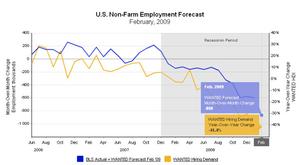Contact Information: Note to editors: Trademarks and registered trademarks referenced herein remain the property of their respective owners. Media Contacts: Ms. Juli A. Morris Director of Marketing Tel: (212) 242-4703 Email: Mr. Martin Auclair VP Finance and CFO Tel: (418) 523-6663, ext. 337
WANTED Estimates Decline of 868,000 Jobs in Upcoming February '09 BLS Employment Report
Hiring Demand Data Show Declines Slowing in Finance and Insurance
| Source: WANTED Technologies
NEW YORK, NY--(Marketwire - March 5, 2009) - WANTED Technologies (TSX-V : WAN ), the leading
source of insight and analysis based on hiring demand, is forecasting that
the Bureau of Labor Statistics will announce a loss of 868,000 jobs in its
upcoming report on US non-farm payrolls for February 2009. WANTED's
forecasting model incorporates overall hiring demand based in part on a
weekly measurement of the number of job ads placed with online job boards.
"When you include hiring demand in the non-farm payroll model, the
forecasted loss is quite large," said Bruce Murray, President and CEO of
WANTED Technologies. "Demand is still well below the prior year and about
at the same level as in January."
In addition to forecasting the change in total non-farm payrolls, WANTED is
also forecasting changes in selected industry payrolls. The weekly hiring
demand data that WANTED collects from online job boards is detailed enough
to be able to track employment levels at the industry and occupational
level.
For the selected industries forecasted for February, WANTED is predicting a
loss of 61,000 jobs in Transportation and Warehousing; a loss of 24,000
jobs in Finance and Insurance; and a gain of 36,000 jobs in Healthcare.
Notable within these forecasts is the prediction that the rate of decline
in the Finance and Insurance sector may be stabilizing. Job losses in that
sector continue, but the number of jobs being eliminated each month is
approximately the same as the monthly losses each month for the prior four
months.
WANTED's estimates are based on a model that incorporates its own hiring
demand data with data supplied by government agencies and other leading
researchers. WANTED analyzes more than six million job listings per week --
giving it an extraordinary amount of information about what is -- and is
not -- happening in the employment market. Over the past five months, when
the demand for labor dropped precipitously in the wake of the financial
crisis, WANTED's model was able to anticipate the employment losses more
accurately than other consensus estimates released prior to the BLS
figures.
Later this month, WANTED will launch its subscription-based Hiring Demand
Indicators, a web-based service that permits clients to access hiring
demand levels across geographies, industries and occupations.
WANTED also supplies its data to The Conference Board, which relies on it
to produce its monthly Help-Wanted OnLine Data Series™.
About WANTED Technologies Corporation
WANTED is the leading source of insight and analysis based on hiring
demand. Clients in the media, HR/staffing, financial services and
government sectors use WANTED's online data and SaaS-based analytical
solutions to identify economic trends, analyze competitive and market
activities and prioritize sales opportunities.
WANTED is also the exclusive data provider for The Conference Board's
Help-Wanted OnLine Data Series™, the monthly economic indicator of
hiring demand in the United States.
WANTED Technologies (TSX-V : WAN ) was founded in 1999. The company's
headquarters are in Quebec City, Canada, and it maintains a US-based
subsidiary with primary offices in New York City. The company began
collecting detailed hiring demand data in October 2002, and currently
maintains a database of hundreds of millions of unique job listings. Visit
www.wantedtech.com for more information about how WANTED helps
organizations make better decisions and improve sales results.
The TSX Venture Exchange does not accept responsibility for the adequacy or
accuracy of this release. Any statement that appears prospective shall not
be interpreted as such.
